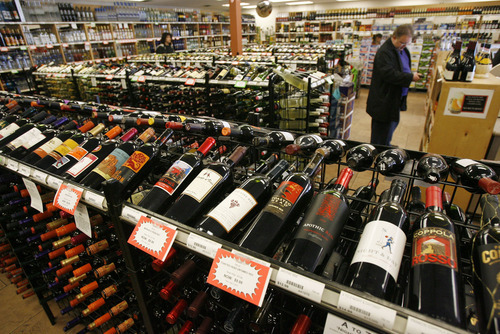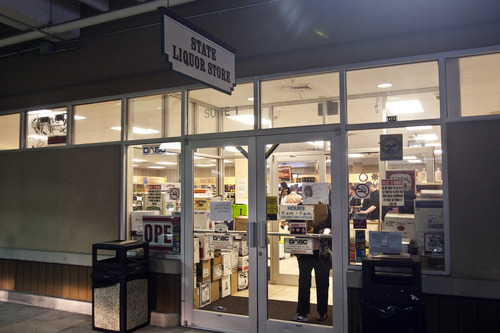This is an archived article that was published on sltrib.com in 2011, and information in the article may be outdated. It is provided only for personal research purposes and may not be reprinted.
The sponsor of a plan to privatize Utah liquor stores says he is getting strong support from House colleagues and the body's leaders, and on Wednesday, he won the backing of the state Privatization Policy Board.
"It's almost been universal," said Rep. Ryan Wilcox, R-Ogden, who presented his proposal to the privatization board Wednesday. "Much more so than there has been before."
Wilcox is crafting a proposal aimed at getting Utah out of the business of running liquor stores. Instead, the state would control the supply of liquor at the warehouse level, but it would essentially franchise the retail liquor sales to private operators.
He said one of the reasons he has garnered more support is because of the "politics the [Department of Alcoholic Beverage Control] has played with shutting down the stores," a result of budget cuts by the Legislature.
Gov. Gary Herbert said Tuesday that his office was moving money into the DABC to avert the closure of nine state liquor stores at least until early next year. A $2.2 million budget cut by the Legislature had threatened those stores with closure, while reducing hours at remaining stores.
Wilcox said he came out with his proposal early so he could spend months building support before next year's legislative session. He has been assured by House leaders that there will be a discussion of the plan during legislative interim meetings this summer or fall.
"What we have is working, and it works well if it's left alone," said Sam Granato, chairman of the state liquor commission, which hasn't formally discussed the privatization proposals.
"We run it as a private business now, as it is. We have a great selection, and if it was privatized, the selection would not be as broad as it is now," he said. "Also, the profits we put into the state coffers now would diminish."
Granato said there would be a short-term infusion as the state sells off its stores, but the annual income would disappear.
Liquor sales generated $279 million in sales and $101 million in profits for the state last year, with a portion of the proceeds going to the state's school-lunch program.
Utah currently imposes an 86 percent markup on liquor and wine. Wilcox said the state could continue to take that markup — which might mean an increase in retail price — or, with the reduced overhead from not running stores, could shrink the markup, maintain profits and let franchises keep a portion of the sales.
Wilcox, who is LDS, said he is uncomfortable with the state profiting from liquor sales at all, but it is impractical to think the state would give up control over the distribution.
There are 18 so-called "control" states, but according to Wilcox, only two — Utah and Pennsylvania — have complete control of the distribution and retail liquor sales, and Pennsylvania has proposed ending its monopoly.
The state Privatization Policy Board, created to advise the Legislature on which government functions could be turned over to the private sector, unanimously approved a letter to legislators Wednesday endorsing the privatization plan.
"We believe that, although there are difficult political issues, the state should carefully consider the reasons for Utah … being in the alcohol business and evaluate ways to move this activity to the private sector," the letter said.
Randy Simmons, a Utah State University professor and chairman of the privatization board, said supporters of state-run liquor stores argue that it reduces consumption, drunken-driving fatalities and other alcohol-related problems, but he said that isn't the case.
"The purposes for being a control state are false," he said.
Simmons pointed to a recent report by Duquesne University economics professor Anthony Davies and George Mason University graduate student John Pulito that concluded that states with privatized liquor stores had significantly lower rates of alcohol-related traffic fatalities.
"Our results suggest that concerns that privatization of state-controlled markets would lead to an increase in alcohol-related traffic fatalities may be unfounded," wrote Davies and Pulito, "and that the state control of alcohol markets itself may be a factor in increasing alcohol-related traffic fatalities." —
Online
Research published earlier this year found that liquor 'control states' had higher alcohol-related traffic fatality rates than states where liquor was sold by privately owned stores. Read the study here http://bit.ly/k0Ht0c





